Tehran cafe shut down over women bikers’ event
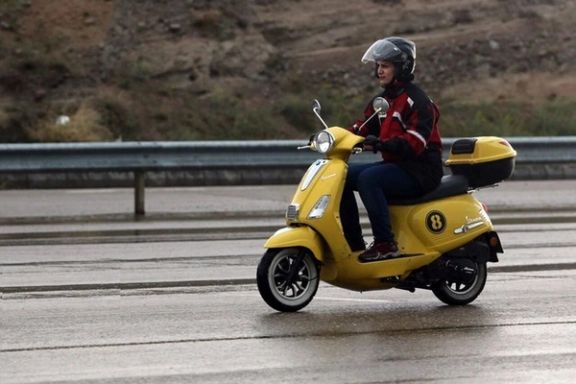
A café in northern Tehran was sealed off late Thursday after announcing an event for female motorcyclists scheduled the next day.

A café in northern Tehran was sealed off late Thursday after announcing an event for female motorcyclists scheduled the next day.
The café’s Instagram page had advertised a Friday gathering with a DJ and cash prizes for participants. But it later posted an image of a police closure notice and urged followers not to attend.
Despite extensive legal restrictions, more women have taken up motorcycles in Iranian cities in recent years, particularly since the protests over Mahsa Amini’s death in morality police custody. The trend has spread beyond Tehran to places such as Yazd and other provinces, according to officials.
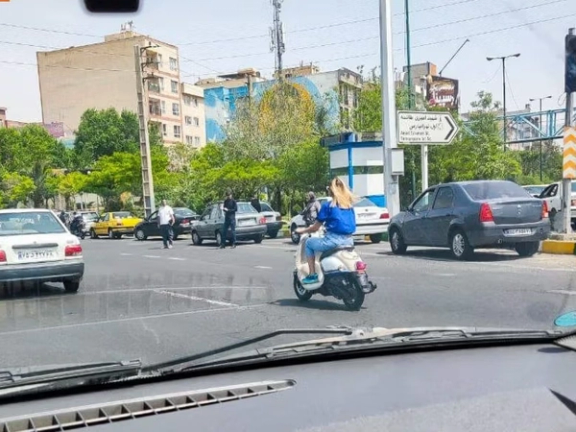
Under current law, women are barred from obtaining motorcycle licenses. The traffic code amendment passed in 2010 specifies men only, leaving women who ride in a legal vacuum. Driving without a license is an offense, yet enforcement against women riders has been uneven, with police issuing warnings or seizing bikes at their discretion.
Kazem Delkhosh, deputy in the parliamentary affairs office of President Masoud Pezeshkian, said in August the government is considering changes. “We are preparing legislation for women who want to ride and the women’s affairs office is also working on a bill,” Delkhosh told the state-run Iran newspaper.
Lack of licensing carries wider consequences, he added. “If a female rider is injured or causes damage, there is no license to hold her accountable or for insurance to cover losses,” Delkhosh said.
Senior police officials maintain the current ban is binding. “According to existing law, licenses for female motorcyclists cannot be issued,” the deputy head of the traffic police said last month.
Religious ban
Clerics often argue that women riding motorcycles (or bicycles) in public settings may attract male attention, threaten societal morality, and undermine women’s chastity—even if they're fully covered.
Others, however, argue the restrictions are inconsistent. “If a woman can drive a bus or truck and earn people’s trust, why not a motorcycle?” sociologist Maryam Yousefi asked in an interview with Iran newspaper.
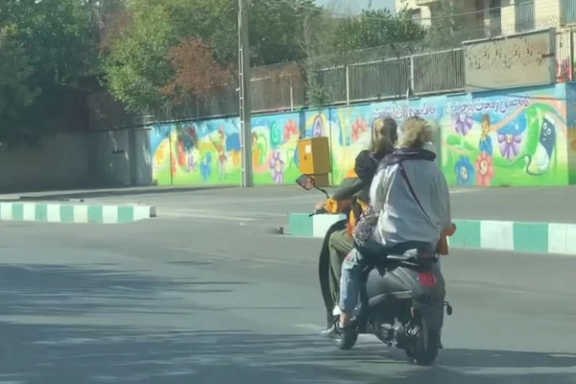
Rights groups have repeatedly called for change. On International Women’s Day this year, 30 organizations demanded an end to gender-based discrimination.
The sealing of the café has once more underscored the clash between social realities and restrictions, leaving women riders caught between growing public visibility and an unresolved legal void.
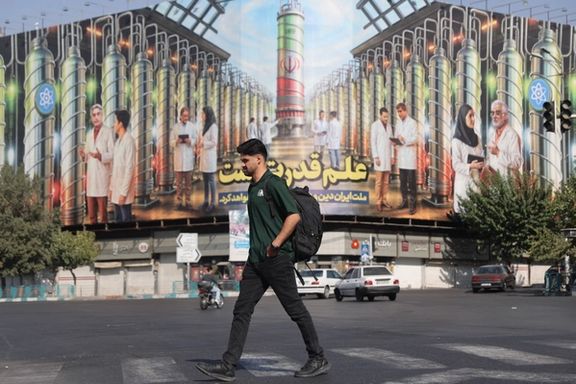
Several newspapers in Iran have warned that the return of UN sanctions and threats of renewed conflict with Israel could plunge the country into crisis, while also noting that some officials downplay the risks.
In the hardline Kayhan daily, columnist Jafar Bolouri described the country’s situation as “extraordinary,” cautioning that a new war could erupt at any moment alongside worsening economic and social pressure. He said the government’s priorities “do not match the situation,” accusing it of focusing on secondary issues instead of inflation, which “creates openings for enemies to exploit.”
The IRGC-linked Javan wrote that Western powers, unable to achieve their goals in the June 12-day war, are now using the snapback process as part of a “cognitive war” to inflame the economy and provoke unrest. “Supporters of the Zionist regime…exploit the snapback and hostile media to stir inflation, currency volatility and social unrest,” the paper said, warning that “domestic infiltrators” amplify these pressures.
The reformist Ham Mihan criticized what it called complacency among officials. “Snapback leads to the return of Security Council resolutions and gives sanctions a binding legal character. Evading them will be very difficult and costly,” the paper said. It added: “Some believe snapback adds little to existing sanctions. Such an interpretation is completely wrong.”
Snapback countdown
On August 28, Britain, France and Germany triggered the UN snapback mechanism, demanding that Tehran return to talks, grant inspectors wider access and account for its uranium stockpile. Under Resolution 2231, sanctions will automatically return after 30 days unless the Security Council votes otherwise.
Tehran has rejected the step. Foreign Minister Abbas Araghchi told EU foreign policy chief Kaja Kallas in Doha on Thursday that the decision was “illegal and unjustifiable,” and insisted that the EU should “play its role in fulfilling its responsibilities to neutralize moves against diplomacy.”
IAEA report raises alarm
A confidential report by the International Atomic Energy Agency said Iran’s stockpile of uranium enriched to 60% remains “a matter of serious concern” after inspectors lost visibility following Israeli and US strikes in June. The report noted Iran had 440.9 kilograms of 60% enriched uranium as of June 13, a short step from weapons-grade levels.
IAEA Director General Rafael Grossi told Reuters: “It would be ideal to reach an agreement before next week. It’s not something that can drag on for months.”
Officials downplay risks
Not all voices share the newspapers’ sense of alarm. IRGC political deputy Yadollah Javani called snapback talk a “psychological operation” to mask Western defeat in the June war. Babak Negahdari, head of parliament’s research center, argued that “the real pressure on Iran has come from US secondary sanctions,” and said any UN measures could be blunted by Russia and China, though he acknowledged “psychological and economic side effects if not handled carefully.”
Former presidential chief of staff Mahmoud Vaezi stressed that “some individuals do not understand the sensitivity of this moment” and warned against rhetoric that fuels division. He said the 12-day war had proved “national cohesion has completely overturned the enemy’s calculations,” and urged leaders to focus on preserving unity.

The vicious debate over a free concert at Tehran’s most iconic square—and its eventual cancellation—has laid bare not only the rulers’ fear of spontaneous crowds but also deep rifts among Iranians themselves.
Supporters hailed the plan to feature renowned vocalist Homayoun Shajarian at Azadi (Freedom) Square as a rare chance for collective joy, while critics denounced it as a state ploy to deflect from the looming anniversary of Mahsa Amini’s death in custody.
Some urged Iranians to seize the event as a protest, while hardliners at home warned it would unleash unrest.
Shajarian, son of the late maestro Mohammad Reza Shajarian, announced on Instagram that after years of denials by the Ministry of Islamic Culture and Guidance, he had finally been granted permission to hold a free public concert.
He described it as the fulfillment of an impossible dream.
“This concert is neither for anyone nor at anyone’s request. I stood with the people during the war with Israel, and now I just want to lift their spirits,” he said.
Sudden storm
Critics were quick to react.
“The Homayoun Shajarian 'concert' is not a concert—it’s a government project … Those who take part in it (under any pretext) are without question agents of the regime and its foot soldiers,” one posted on X.
Ultra-hardliners claimed the state lacked the security capacity to manage such a gathering.
Supporters countered that the city had organized vast religious rallies like the “10-Kilometer Ghadir Feast” even during the turmoil following the recent 12-day war with Israel.
Sadegh Koushki, a politician close to the ultra-hardline Paydari Front, condemned the idea, calling it a show of numbers meant to “extort revolutionary people and the Leader.”
Filmmaker Abolghasem Talebi warned the event would become “a display of nudity” and a launchpad for protests.
“A free concert in Freedom Square means lawlessness,” he said. “First Shajarian, then others. Gradually, we’ll face a coup of public squares through nudity and unveiled women—with government permission.”
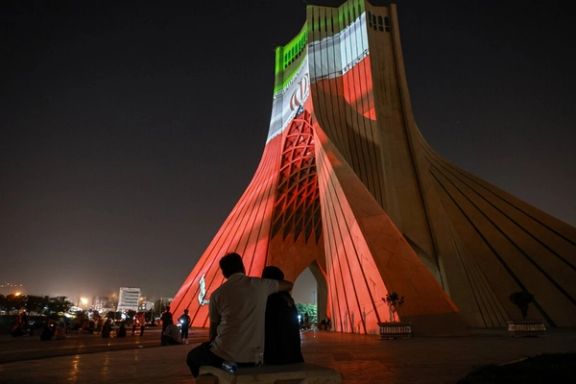
Cancellation
By Wednesday, Shajarian admitted his worst fear had come true: the concert would not take place, and his “impossible dream” would remain out of reach.
Tehran’s ultra-hardline mayor, Alireza Zakani, said security authorities had rejected the plan because of “time constraints” and lack of preparation, proposing to move it to the 12,000-seat Azadi Stadium.
Municipality officials claimed they were only informed days earlier, but the government countered that preparations had long been under discussion.
Government spokeswoman Fatemeh Mohajerani said the administration had supported the event from the start, asserting that "millions" attending would have strengthened national unity.
Administration public relations chief Ali Ahmadnia said Freedom Square remained the priority but the 100,000-seat Azadi Stadium could serve as a fallback.
Shajarian has reportedly ignored officials’ calls, and many supporters on social media say they will not attend if the concert is not held at Freedom Square.
‘Problem lies elsewhere’
The cancellation itself became a new battlefield, as critics highlighted what it revealed about the establishment’s insecurity.
Many believe the decision stemmed from fear that massive crowds would dwarf the regime’s own rallies in Freedom Square, which often struggle to fill even with free transport, food, and mandatory attendance.
Sociologist Mohammad Fazeli ridiculed the municipality’s claim of being unprepared: “Fine, give them two weeks! If they’re not lying, they can prepare. Otherwise, their problem lies elsewhere.”
Veteran reformist Abbas Abdi, writing in Ham Mihan, argued that those in power fear the people more than foreign invasion. “Domestic warmongers and hardline opposition [abroad] alike oppose peaceful, joyful gatherings,” he wrote.
“From the start, I doubted authorities would accept such a security risk,” political analyst Omid Memarian told Iran International.
“The cancellation proves the regime lacks self-confidence and reveals the depth of the rift between people and the state.”

Firsthand accounts reveal how severe water and electricity shortages are disrupting daily life across Iran, with blackouts causing life-threatening accidents and hardship for vulnerable families.
In one video, a woman with a broken leg, filmed in a hospital, pleads with officials to step aside if they cannot provide basic services.
“Why in the 21st century should we have power outages?” she asks. “If you can’t run the country properly, you better get lost.”
She explains that her diabetes requires overnight monitoring before surgery.
Another clip shows a woman describing repeated falls in the dark. Pointing to a cane on the floor, she says: “Now I have to move around with this. I swear to God I don’t even have a single rial to go to the doctor and get an X-ray.”
Other footage shows a man trapped in an elevator after a sudden outage, urging that buildings be equipped with emergency systems to prevent such dangers.
Daily disruptions
From Sari to Mashhad, residents describe routine blackouts at night and during business hours.
A young man in Sari says the power cuts every evening from 9 to 11 p.m., while a merchant in Mashhad films a bazaar left in darkness.
“Look at the bazaar,” he says. “How can these people make a living and pay their rent?”
In Tehran, a customer records shoppers enduring stifling heat in a hypermarket after air conditioning and lighting failed.
“This place used to be cool and comfortable, but now everything is off,” he says. “People are forced to shop in this unbearable heat.”
Official response
Energy Minister Abbas Ali Abadi has promised improvements.
“Soon the water situation will improve, the gas situation will improve, and weather conditions will also cooperate,” he said this week, before adding the telling qualification: “God willing.”
But Iran’s reliance on decades-old thermal power plants—still providing over 80% of electricity—alongside shrinking hydroelectric capacity due to prolonged droughts has left the grid deeply vulnerable.
Spring hydro output has collapsed from about 6,500–7,000 megawatts to only 2,500.
Public embarrassment
The crisis has also spilled onto national television.
One widely shared clip shows a state broadcast plunging into darkness shortly after a lawmaker claimed an alleged Israeli pilot’s “confession” would soon air.
Israel’s Foreign Ministry mocked the scene on X, posting in Persian: “Just make sure the power doesn’t go out in the middle of broadcasting the confession.”
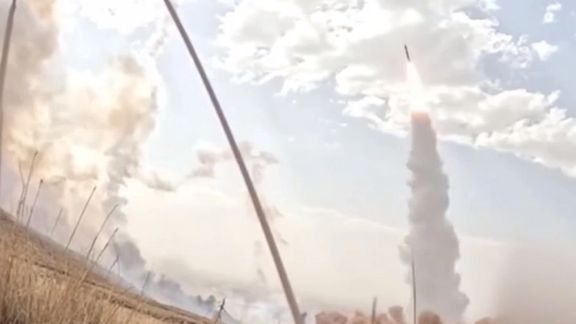
Time is running out to avert a nuclear crisis, Nicole Grajewski of the Carnegie Endowment said, describing Iran's nuclear program as a complex file where diplomacy is limited, military strikes are insufficient, and Europe’s snapback of UN sanctions risks sparking fresh conflict.
Grajewski told Iran International's Eye for Iran that only Washington can break the deadlock by re-engaging directly with Tehran and backing a short extension that ties International Atomic Energy Agency (IAEA) inspections to credible security guarantees.
In June, Israel waged a 12-day air campaign against Iranian nuclear and military sites; the United States followed with bunker-buster attacks on fortified facilities at Natanz, Esfahan, and Fordow.
Tehran responded by restricting IAEA access. Soon after, Britain, France, and Germany — the E3 — formally invoked snapback under UN Security Council Resolution 2231. The mechanism automatically restores pre-2015 UN sanctions in 30 days unless the Council unanimously endorses continued relief.
Foreign Minister Abbas Araghchi accused Europe of “acquiescing” to Washington and Israel and warned any reinstated sanctions would be “null and void.” Iranian lawmakers have threatened to quit the Nuclear Non-Proliferation Treaty (NPT)—the cornerstone pact that obliges Iran to cooperate with the IAEA — if UN sanctions return.
Grajewski warned that such a step could be a trigger for war.
“Iran could withdraw from the NPT. And this is where you might see another conflict between Iran and Israel, more Israeli strikes on Iran’s program,” she said. “They’ll use the excuse that now we can’t see Iran’s nuclear program. We no longer have inspectors.”
She also cautioned against overreliance on force. “It’s unclear what we could have achieved with diplomacy. And it’s also clear that military action alone can’t solve the Iranian nuclear issue,” she said. President Donald Trump, for his part, has defended the June strikes as necessary.
What can Washington do now?
Grajewski urged the United States to resume direct or indirect talks, press for restored IAEA access, and offer a narrow, conditional assurance: no new strikes on nuclear facilities during a brief extension, so long as Iran meets inspection and transparency benchmarks. That package, she argued, could unlock a six-month snapback extension and lower the odds of escalation.
Moscow has floated a counter-resolution at the UN and, as Grajewski noted, is adept at using UN procedures to delay investigations and enforcement.
Grajewski tied today’s impasse back to the collapse of the 2015 nuclear deal, the Joint Comprehensive Plan of Action.
“Had the JCPOA remained in force, we probably wouldn’t have seen the 12-day war,” she said. But she added that Tehran overplayed its hand: “Iran has made so many terrible decisions… showing off their capabilities” exposed weaknesses and hardened adversaries’ resolve.
For now, the file sits on a knife-edge. “A crisis is not inevitable,” Grajewski concluded. “It’s possible and it’s somewhat likely — either a diplomatic crisis with NPT withdrawal or potentially something kinetic. But it’s not a foregone conclusion.”
Watch the full Eye for Iran episode on YouTube, or listen on Spotify, Apple, Amazon, or Castbox.
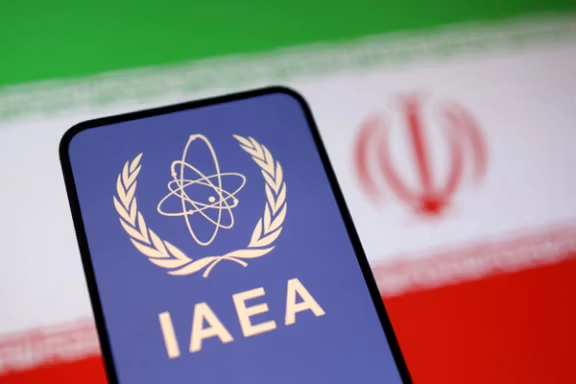
A new round of talks between an Iranian delegation and the International Atomic Energy Agency will be held in Vienna on Friday, Iran’s ambassador to international organizations in the city said, according to state media.
Reza Najafi said the negotiations continue consultations on defining cooperation “within the framework of parliament’s law under new conditions.” He added the talks will determine “a new form of cooperation between Iran and the IAEA.”
Following Israeli and US military strikes on Iran in June, parliament passed a bill suspending cooperation with the IAEA and imposing new restrictions on inspections. Any arrangement for renewed access must now be approved by Iran’s Supreme National Security Council, and no agreement for inspections or resumption of the IAEA’s broader work has yet been reached.
On Thursday, Foreign Minister Abbas Araghchi met EU foreign policy chief Kaja Kallas in Doha. Araghchi said the European move to restore UN sanctions was “illegal and unjustifiable” and stressed that Tehran expects the EU “to play its role in fulfilling its responsibilities to neutralize moves against diplomacy.”
The two sides agreed to continue consultations in the coming days and weeks.
IAEA warns on uranium stockpile
The International Atomic Energy Agency said this week that Iran’s inventory of uranium enriched to 60% remains “a matter of serious concern” because inspectors lost visibility after the June war.
In a confidential report seen by reporters, the agency said Iran had 440.9 kilograms of 60% enriched uranium as of June 13, an increase of more than 30 kilograms since May. That material is only a short step from weapons-grade levels. The total stockpile stood at nearly 9,875 kilograms.
The report also confirmed that two inspectors mistakenly took documents from the Fordow site back to Vienna, which the agency called an “error” but not a security breach. Tehran subsequently barred them from returning.
Grossi urges quick progress
IAEA chief Rafael Grossi told Reuters that another round of talks with Iran would take place in Vienna this week and said the issue “cannot drag on for months.”
“It would be ideal to reach an agreement before next week,” Grossi said, stressing the need to verify that Iran’s highly enriched uranium remains under control. “I believe there is a general understanding that the material is likely still there, but it must be verified.”
Grossi added: “We have reminded our Iranian counterparts that domestic laws create obligations for Iran, not the IAEA.”
Limited access after war
Since the June conflict, inspectors have only been allowed into the Bushehr nuclear power plant, where they observed a fuel replacement in late August. Bushehr operates with Russian assistance and was not struck during the war.
Iran’s atomic energy chief Mohammad Eslami confirmed that inspectors entered the country with authorization from the Supreme National Security Council. He accused the IAEA leadership of acting under Western pressure, saying, “Our enemies always find excuses to pressure the Iranian nation.”
Snapback sanctions in play
The European powers Britain, France and Germany triggered the UN “snapback” mechanism on August 28, seeking to restore sanctions lifted under the 2015 nuclear deal. They demanded that Iran return to talks, grant inspectors wider access, and account for its uranium stockpile.
The snapback mechanism, created under Resolution 2231, automatically restores sanctions after 30 days unless the UN Security Council votes otherwise. The provision expires in October.
Tehran has rejected the step, with officials warning that Iran could even withdraw from the Nuclear Non-Proliferation Treaty if pressure mounts further.